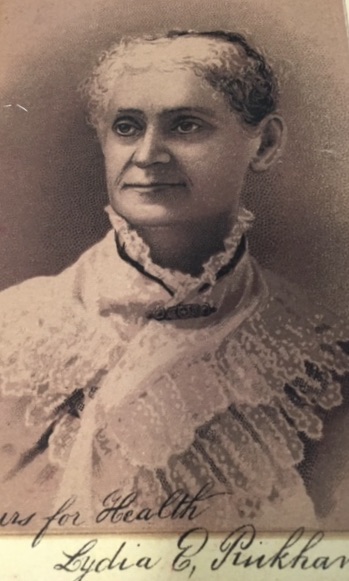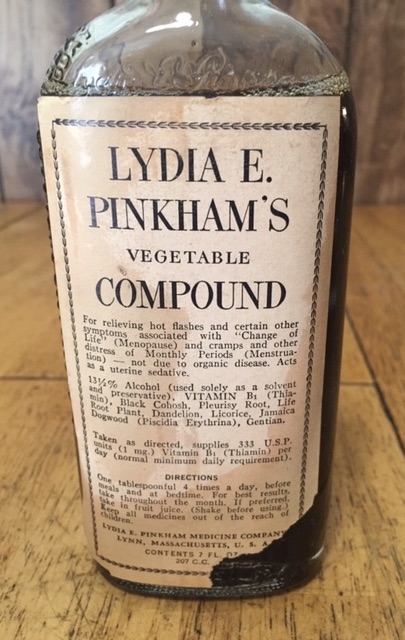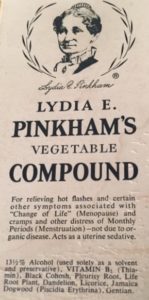News Podcast – Weather – Lydia Pinkham News & Photos – Video of the Day
Former GE CEO Jack Welch dies at 84, born in Salem; Amesbury man charged with fatally stabbing mother sent for evaluation; Beverly library board selects new director; Busy Super Tuesday turnout expected; Salem man held on drugs and guns charges, after allegedly violating hands-free driving law; State inmates to get addiction meds
North Shore Today newscast with Bill Newell and Rick Moore
Weather: Good weather day to vote
ENTERPRISING WOMENÂ
Lydia Pinkham was a caring herbalist whose
patented elixir was marketed world-wide
SALEM — Oh, for the days of Lydia E. Pinkham’s Vegetable Compound, made lovingly for women in monthly  distress. Swooning could be so much fun.
distress. Swooning could be so much fun.
Lydia Pinkham made the pleasing tonic in her Lynn basement and distributed it, free of charge, to her friends and neighbors. It worked, so she went commercial, becoming the country’s most famous woman in the late nineteenth century. A canny marketer, her herbal and alcohol-enhanced tonic reached women in all corners of a world market. Essences of unicorn root, life root, black cohosh, pleurisy root and fenugreek seed were supplemented with a generous splash of alcohol — 18 percent, in some cases. The medicinal potion was the subject of drinking songs in colleges everywhere.
Boston’s North Shore boasts more than its share of enterprising women. The House of the Seven Gables honors several trailblazers this year — the 100th anniversary of the passage of the 19th Amendment guaranteeing women’s right to vote. The first woman of note in The Gables’ Enterprising Women lecture series is Lydia Pinkham. Historian and Secretary of the Board of Trustees at The Gables, Irene Axelrod, will deliver a rare and lively presentation on Wednesday, March 11, from 6:30 to 8 p.m., at The House of the Seven Gables, 115 Derby St., Salem. General admission is $10.
Despite Lydia Pinkham’s success marketing her famous compound, not a lot is known about her. Intrigued, Axelrod launched a series of investigations in  search of information about Pinkham. She consulted museums, libraries and various data bases, including the Schlesinger Library, keeper of Pinkham’s business papers. The book, “Female Complaints and the Business of Women’s Medicine,†by Sarah Stage in 1979, was among the most helpful sources.
search of information about Pinkham. She consulted museums, libraries and various data bases, including the Schlesinger Library, keeper of Pinkham’s business papers. The book, “Female Complaints and the Business of Women’s Medicine,†by Sarah Stage in 1979, was among the most helpful sources.
Axelrod explains how Pinkham’s tonic evolved. “She had been giving away the medicine she made in her basement and it became quite popular,†she said. “Word spread and people traveled to get it. Her children said, ‘Why don’t you charge for it?’ and she began producing more, eventually building a factory next to her house in Lynn.â€
Pinkham was in the business of helping women, and the tonic was meant to ease a number of complaints. The family traveled to New York City to sell the tonic to pharmacies on consignment. At the time, the country was in the grips of major recession and Pinkham’s husband had lost a series of businesses. A series of smart marketing tactics furthered her product’s reach. “She was the first American woman to have her picture on her product and that was how she first became famous,†says Axelrod, who is saving some of the best stories about Pinkham for her presentation on March 11.
About The House of the Seven Gables Settlement Association and its mission Â
Â
Vision: To preserve, share and continue the American story.
Mission: To be a welcoming, thriving historic site and community resource that engages people of all backgrounds in our inclusive American story. For more information visit www.7gables.org.
Photos - Lydia Pinkham, who developed the medicinal tonic known as Lydia E. Pinkham’s Vegetable Compound, was immortalized when she put her picture on the label and shipped the tonic to customers around the world.Â







